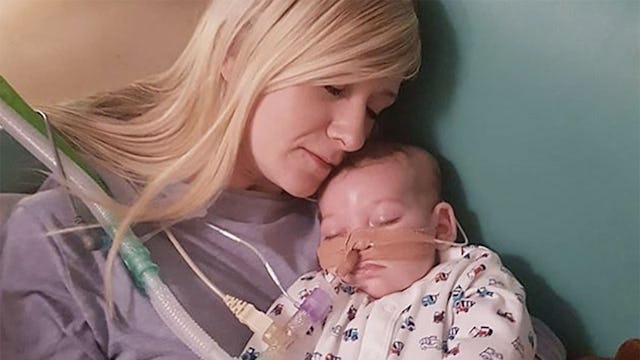Charlie Gard's Life Matters

You might have heard about Charlie Gard.
He’s been all over the news, all around the world.
Charlie is an 11-month-old child with mitochondrial disease who lives in the UK. He has severe brain damage and has been on a ventilator for months.
Now his parents want to take him to the U.S. for an experimental treatment — a treatment that could potentially improve his quality of life. They want what they believe is best for Charlie. However, doctors at Great Ormond Street Hospital for Children — where Charlie has been an ICU patient since October — disagree with Charlie’s parents and believe it is in his best interest to take him off of his ventilator.
Though millions around the world have been following the ensuing legal battle between Charlie’s parents and the hospital, it is difficult to relate to them when you are watching from the sidelines.
But I have stood in Charlie’s parents shoes.
I still live it, every day.
My daughter also has a rare mitochondrial disease and suffered devastating brain damage (progressive cavitating leukoencephalopathy) when she was 9 months old.
I, too, was told that my daughter would just continue to get worse, that there was no treatment, no cure. To give up and let her go, just like Charlie.
And just like Charlie’s parents, I refused to listen to the doctors. As every parent of a terminally ill child will do, I researched, reached out, and never stopped trying to find something, anything, to help my daughter. And my daughter did not get worse.
Treatment and hope are not pointless. Believe it or not, recovery, even from severe brain damage caused by a mitochondrial disease, is possible. With treatment and time, my daughter stabilized. And with the time that treatment bought her, she regained many of the skills she had lost. Her doctors can only attribute her improvement to neuroplasticity — the brain’s ability to reorganize itself.
My daughter went from having the motor skills of a 2-month-old infant at 10 months old to now being able to speak, orally eat, and use a manual wheelchair and even a walker at 2 1/2 years old.
Savitha Thampi
It has been two years since my daughter suffered catastrophic brain damage. When she was diagnosed with a mitochondrial disease, only three other children were known to have her condition, and all three passed away as infants. Since then, 15 more children with the same mitochondrial disease have been reported. Thirteen of them are still alive, and stable, and thriving, even into their teens.
Hope.
Yes, these children are still disabled, and ultimately still terminally ill.
But does that matter?
I know many children with life-limiting illnesses who are tube-fed, on ventilators; who are quadriplegic, blind, deaf; who cannot hold up their own heads. But I see the light in their eyes as they watch Frozen, their smiles when they feel the sunlight on their skin, the joy that they bring to the world.
My daughter and I have been given the gift of time, time to be together, time to be alive.
Charlie’s parents are good, caring, loving, conscientious parents who want to give their son a chance to live. They’re not expecting a cure, but a chance to experience life. They understand that it is the slimmest of chances, but they still want to try to fight for their son.
I would, and I quite possibly will, do exactly the same for my daughter. Wouldn’t you?